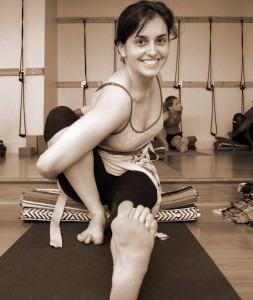Yoga is useful for all women…not just the super-bendy or the super trendy. And, if you think yoga is just a physical thing, think again.
From puberty to menopause, throughout monthly ups and monthly downs, yoga is a powerful tool. It helps us blend our awareness of our body with our emotions and thoughts and it can uplift and strengthen a woman through all phases of her life.
When I set out to interview women who practice Iyengar yoga for this article, I thought I would hear the usual reasons for their dedication to yoga. I expected to hear about stress relief, the importance of making time for yourself, and relaxation.
But what I found from the two women featured here was much different than what I expected. You might be surprised to hear what makes them show up for yoga.
Simone Wilson, 35, has been practicing yoga for 10 years and doesn’t think she could live without it. She first started practicing while working on her graduate thesis to relieve stress.
Wilson who has worked in a fitness center and taught spinning, especially likes the way that Iyengar yoga encourages a specific kind of practice during the monthly menstrual cycle. “During my cycle. I used to do what I usually did and pretend that nothing different is happening”, she says. “I think that’s how women go through life. I used to have the attitude that unless I really couldn’t move, I should push on! But since I started doing yoga, strength means something completely different than it used to, which was to ignore how I really felt. In my practice, I learned to support my own body weight. That’s mental strength as well”.
Post-thesis, she continued practicing yoga, taking classes throughout both of her pregnancies. She noticed that even while pregnant, she continued to grow stronger in the poses. “I was more aware of my body”, she says. “ I was able to do headstand, and had the strength to stay up even longer than I could before”.
Becca Franklin, 26, emphasized how yoga can help young women become more comfortable with their bodies. She cites the pressure on young women in our society to be shaped a certain way and to look a certain way. “Yoga helped me not to look at my body as an object – but to have a more internal experience of myself. My experience of my body has now expanded to include what I can do and what my body is capable of,” she says.
“During our twenties, we are looking to find our place in the world – to find a job, make friends and perhaps, find a partner,” she says. “Yoga is something that can take you from feelings of anxiety and uncertainty to helping you understand who you are and what your values are.”
Both Wilson and Franklin agree that the benefits of practicing yoga has helped them better deal with their emotions.
Wilson explains she is very good at multi-tasking. But yoga has helped her let go of the idea of having to do fifteen things at the same time. Now she concentrates on five! One of the major benefits of doing yoga she says is that it helps her connect with her husband at the end of the day. “ In everyday life situations, I now will often reflect on something before I just react.”
This attention to how our physical and emotional lives are inextricably linked is another reason why yoga is a boon for women. Iyengar yoga expert, Bobby Clennell, author of The Woman’s Yoga Book: Asana and Pranayama for All Phases of The Menstrual Cycle teaches women to watch how their hormonal rhythms play out in the body and the emotions.
Franklin says yoga has helped her take responsibility for her emotions and where they lead. “ I would get all caught up in my emotions,” she says. “Yoga helped me with this. There is a different level of awareness when, say, I am in the middle of a discussion with a friend or family member. I notice now that I have a couple of seconds to check in with what I’m feeling and think before I speak. I think, okay….this is something I have control over. I now have a few seconds to choose. I can make a decision to have an emotional outburst, or I can choose to respond another way. Now, because of my yoga practice, I have control of how my emotions affect what I do, and I have power over this. For me, that was huge.”

